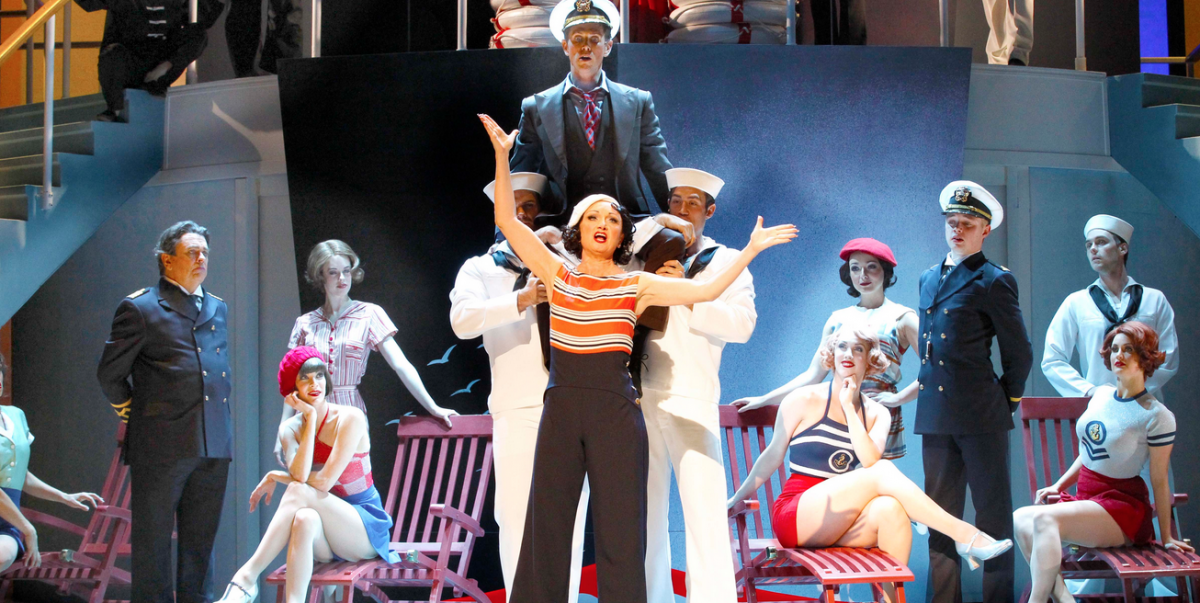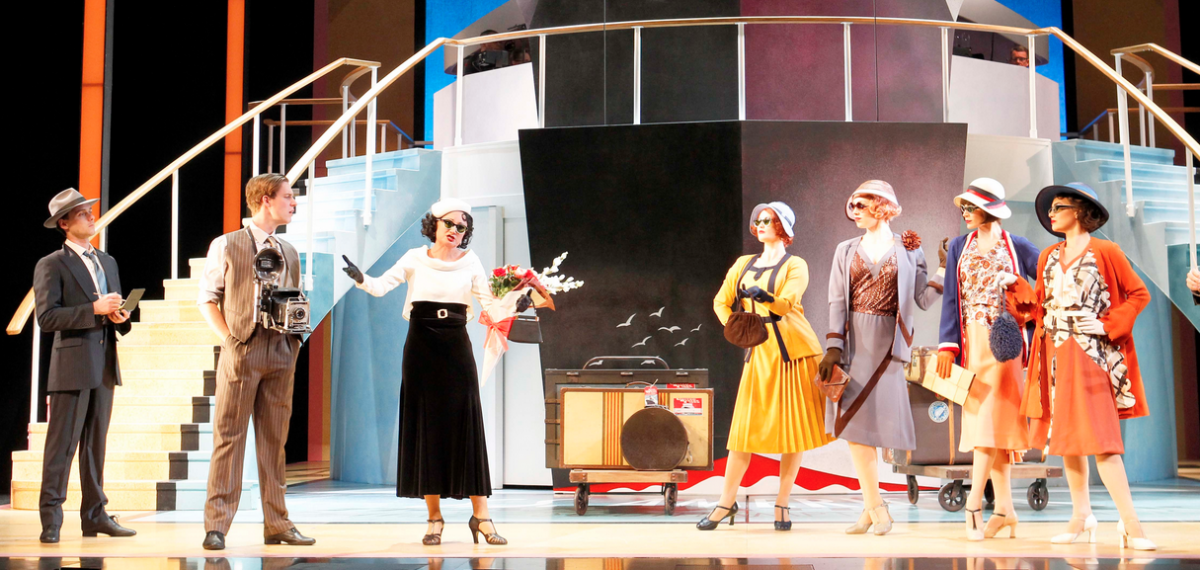★★★☆☆ Caroline O’Connor carries the ship, but too much is lost overboard.
Joan Sutherland Theatre, Sydney Opera House
September 8, 2015
Cole Porter’s depression era, ocean-going musical tonic has had more makeovers than a society matron since it set sail in 1934 complete with Ethel Merman and enough hit songs to sink a battleship. Over the years, and mostly for the 1987 Broadway revival, PG Wodehouse and Guy Bolton’s book has been snipped and contorted to fit a more streamlined narrative, but despite the importing of a few non-original songs, a redistribution of others (Hope originally got The Gyspy in Me and Reno Buddy Beware) and the removal of a certain amount of chorus material, the madcap tale still sports a healthy sense of the 1920s excess it sought to rekindle in leaner times. And of course it has Porter’s joyously subversive lyrics, more enervating than that often referenced “sniff of cocaine”. It’s a pity then that Dean Bryant’s leaden-fisted direction for Opera Australia fails to capture any of that intrinsic sense of subversive permissiveness, or the lightness of touch of the original.
Not that it doesn’t have many of the required constituents for a good night out – those fabulous songs, a fizzy reading of the score, glamorous costumes, several fine singing actors and the magnificent Caroline O’Connor in the central role of club chanteuse Reno Sweeney. Bryant’s problem is that he either doesn’t trust the material or he hasn’t realised that the songs in a book musical are there to lift and heighten the show. Consequently everyone is directed to go at the spoken text hammer and tongs. Subtlety and any sympathy for character goes out of the porthole leaving the work belting away on the same note all evening. Some actors manage to transcend this – O’Connor being a good case in point – through experience, style and a sense of what constitutes ‘going too far’, but too many mug and gesticulate their way through a script that deserves far more laughs than it subsequently gets.

On the plus side, Andrew Hallsworth’s choreography is impressive in the two big numbers and he has a good eye for acting through dance. The title number, though you’ve been waiting an hour for it, brings the curtain down on the first half with a bang and Blow, Gabriel Blow gives the second half an early lift (curiously a lewd sexual spoof on Cristian evangelism would have seemed to raise fewer eyebrows in 1934 than you would imagine today – I wonder what Fred Nile or Cory Bernardi would make of it?) Hallsworth’s staging of Buddy Beware, however, featuring sailors supressing erections as they stare up a woman’s pants is just plain crass.
Tellingly, no one is credited with the set design on the show. Dale Ferguson adapted it, apparently, but from what isn’t made clear. Its art deco lines are functional but it looks cheap and wooden where it should gleam and sparkle. The cabins are furnished with equally tatty furniture and props – hardly a luxury liner. The costumes on the other hand are classy looking affairs, bearing the hallmark of Opera Australia’s excellent wardrobe department. Matt Scott’s lighting design is utilitarian if hardly standout, but Michael Waters’ sound design is boomy and boxy, too big and loud for the Joan Sutherland, especially for a show that would have originally required actors to sing without amplification. Given that the band is visible onstage, sound from the speakers in the auditorium swamps the actual players and nothing in the sound design leads the ear to follow the eye. A pity, as Peter Casey conducted a better than solid reading of the score and the playing throughout seemed excellent.
Fortunately, the aforementioned Caroline O’Connor is outstanding in the comedy lead, exuding experience and burting with heart. She hoofs it up a storm and sings with the lungpower of a Merman but with considerably more nuance. Reno Sweeney is a gift of a role, a bit of a tart with a heart who seems condemned never to get her man, and O’Connor seizes every opportunity in a warm, witty and vibrant performance. Her way with the text, her subtlety with the lyrics, and her inexhaustible clutch purse full of comic business in songs like I Get a Kick Out of You, You’re the Top and Friendship are a joy to watch.

Alex Rathgeber makes a reasonable fist of Billy Crocker. His voice is smooth and flexible when putting across a song like All Through the Night, though the restored You’d Be So Easy To Love is set too high for him. A personable actor, he never quite matches up to O’Connor, ultimately lacking the necessary wattage for the manic, multiple-disguise element of the role. He won the best ‘supporting’ actor at the Helpmanns, but given a more sparkling performance his role should surely have been considered a ‘lead’. Claire Lyon does what she can with the limp, insipid Hope Harcourt, but it’s a dog of a role and prettily though she sings the script gives her virtually nothing to fire off. Her act two song is spoiled by a ham-fisted seat-stacking gag. Todd McKenney is hampered by a comedy wig that frequently hides half of his face and begins rather OTT. He maintains the accent, however, and grows into the part of ‘upper-class twit of the year’ Lord Evelyn as the show goes on. His tango duet with O’Connor is a highlight of the second half.
Two of the worst culprits in the mugging department are Wayne Scott Kermond’s over-forced Moonface Martin, who seems to have walked in from a regional panto, and Gerry Connolly’s ludicrously effeminate Ship’s Captain. Kermond can sing and dance, but his fake Irish accent wanders (I’m sure unintentionally) and his semaphored performance seems to be constantly seeking the audience’s approval. Connolly’s shtick rolls back the clock to the gender politics of the 1970s where every gay man was a Mr Humphries. In Trevor Nunn’s excellent 2003 staging of Anything Goes, I vividly recall two sailors kissing – a non-flagged up nod to the title and the permissive age from which it came. Connolly and Bryant’s cheap campery says exactly the opposite. Well, at least we were spared watching Alan Jones’ attempts at a role that he must surely have pulled put of after seeing what was required.
Debora Krizak as Moonface’s moll, Erma is intriguing. Her astute sense of character and comic timing would have scored more points if she’d been directed to pull it back a couple of notches. Bartholomew John as bombastic financier Elisha Whitney gives an object lesson in character acting and how to choose the right level to play musical comedy. Sadly, as Mrs. Harcourt, Carmen Duncan did not. As the assorted sailors, passengers and Reno’s ‘angels’ the ensemble are notable, busy as beavers while singing and dancing up a storm.
Given the production’s showing at the Helpmann Awards earlier this year, this was a frankly disappointing evening. Plenty of the first night crowd dutifully stood and cheered, but a fair few were left with a sense of wasted opportunity and a feeling of having witnessed a sledgehammer being wielded to crack a nut. Ironically Cole Porter deserves less, not more.
Anything Goes is at the Sydney Opera House until October 31.












Comments
Log in to join the conversation.